|
TABLE OF CONTENTS
Cover
EDITORIAL
- Empowering the Source of our Strength
COVER STORY
- Human Rights Now...
COUNTRY SITUATIONS
- Kashmir: And Disappearances Continue
- Nepal: Supreme Court Judgment...
NEWS FEATURES
- A Week to Remember
- A Memorial Service to the Filipino Nation...
- Healing is Liberating
- “¡Presente!”- A Tribute Concert ...
- Memory, Suffering and Art Counseling
- A Morning or a Dark Night for Human Rights
- Bitter Truth...
PHOTO ESSAY
- Sharpening our Healing Capacities ...
INTERNATIONAL LOBBY
- The Anti-Disappearance Treaty
LETTER OF SYMPATHY
POEM
- For Mothers of the Vanished
|
News Features
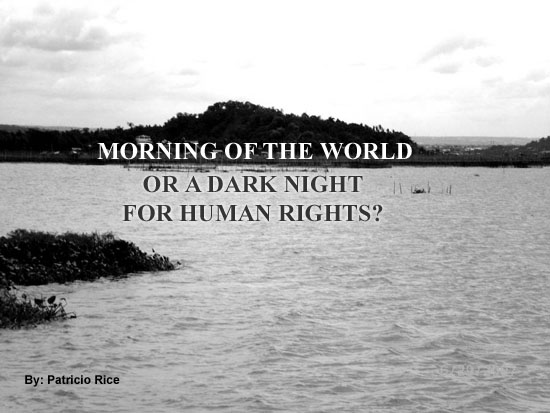
MORNING OF THE WORLD
OR A DARK NIGHT FOR HUMAN RIGHTS? By: Patricio Rice
In the year 2000, the dawn of a new millennium was first celebrated in Asia, and then slowly moved across Europe / Africa finally to the Americas. Perhaps that is why the continent is sometimes called “the morning of the world,” at least here. Flying south to south, from Latin America across South Africa to Asia is to fly into an anticipated day, an unforgettable experience, indeed.
In our contemporary world this geographic paradigm seems to have spilled over into the economic field when one sees gigantic economic forces awakening to dramatically transform urban life in most Asian countries. Manila and even more so Kuala Lumpur and Jakarta leaves one aghast at sky scraper buildings pushing up all around, many 5-star hotels. One is awed at the bustle of the intense traffic with many new automobiles and busy shopping malls mostly furnished with American chain stores, Starbucks, Donuts, KFC, etc. China, India and Japan are usually heralded as the engine room of this new powerhouse. In fact, when I landed back at Buenos Aires, fellow passengers commented how sleepy the airport looked with just a few planes sitting lazily around whereas in Asian airports, one sees endless queues of planes bustling all the time. The Asian tigers are on a rampage, it would seem to the visitor.
However I was to discover “all that glitters is not gold.” Most certainly in the area of human rights, things are not that well, at least, in South East Asia. The poor have been pushed aside into the margins of society where they provide the cheap labor that keeps the Asian tiger purring. I was saddened, for example, to see in Jakarta that most people eat at street stalls which are usually located out of sight in most unhygienic conditions whereas front store restaurants are quite expensive. Public transport is utterly deficient as there are no metro systems and people have to travel for hours on motor bikes, tricycles, jeepneys, etc. to get to work and then home. I did not have time to visit poor townships, but I could sense that people do not enjoy the many social, economic or cultural rights in their homes which are considered normal in other parts of the world. This continuous marginalization of the poor and the public sector clearly points towards a poor human rights performance by the Asian giants contradicting their economic muscle. However, I was inquiring further in the question of enforced disappearances in the Philippines and Indonesia that I could begin to observe the complexities of the situation at first hand.
In the year 2000, the dawn of a new millennium was first celebrated in Asia, and then
slowly moved across Europe / Africa finally to the Americas. Perhaps that is why the
continent is sometimes called “the morning of the world,” at least here. Flying south to south, from Latin America across South Africa to Asia is to fly into an anticipated day, an unforgettable experience, indeed.
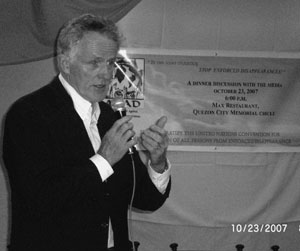 In our contemporary world this geographic paradigm seems to have spilled over into the economic field when one sees gigantic economic forces awakening to dramatically transform urban life in most Asian countries. Manila and even more so Kuala Lumpur and Jakarta leaves one aghast at sky scraper buildings pushing up all around, many 5-star hotels. One is awed at the bustle of the intense traffic with many new automobiles and busy shopping malls mostly furnished with American chain stores, Starbucks, Donuts, KFC, etc. China, India and Japan are usually heralded as the engine room of this new powerhouse. In fact, when I landed back at Buenos Aires, fellow passengers commented how sleepy the airport looked with just a few planes sitting lazily around whereas in Asian airports, one sees endless queues of planes bustling all the time. The Asian tigers are on a rampage, it would seem to the visitor. In our contemporary world this geographic paradigm seems to have spilled over into the economic field when one sees gigantic economic forces awakening to dramatically transform urban life in most Asian countries. Manila and even more so Kuala Lumpur and Jakarta leaves one aghast at sky scraper buildings pushing up all around, many 5-star hotels. One is awed at the bustle of the intense traffic with many new automobiles and busy shopping malls mostly furnished with American chain stores, Starbucks, Donuts, KFC, etc. China, India and Japan are usually heralded as the engine room of this new powerhouse. In fact, when I landed back at Buenos Aires, fellow passengers commented how sleepy the airport looked with just a few planes sitting lazily around whereas in Asian airports, one sees endless queues of planes bustling all the time. The Asian tigers are on a rampage, it would seem to the visitor.
However I was to discover “all that glitters is not gold.” Most certainly in the area of human rights, things are not that well, at least, in South East Asia. The poor have been pushed aside into the margins of society where they provide the cheap labor that keeps the Asian tiger purring. I was saddened, for example, to see in Jakarta that most people eat at street stalls which are usually located out of sight in most unhygienic conditions whereas front store restaurants are quite expensive. Public transport is utterly deficient as there are no metro systems and people have to travel for hours on motor bikes, tricycles, jeepneys, etc. to get to work and then home. I did not have time to visit poor townships, but I could sense that people do not enjoy the many social, economic or cultural rights in their homes which are considered normal in other parts of the world. This continuous marginalization of the poor and the public sector clearly points towards a poor human rights performance by the Asian giants contradicting their economic muscle. However, I was inquiring further in the question of enforced disappearances in the Philippines and Indonesia that I could begin to observe the complexities of the situation at first hand.
The Philippines
Here I was informed that 180 new cases of enforced disappearances and 800 cases of summary executions have taken place since 2001 during the administration of President Gloria Mapacagal-Arroyo. The situation became so alarming this year that the Supreme Court decided to hold a National Consultative Summit on Extrajudicial Killings and Enforced Disappearances “Searching for Solutions” on July 16 -17 in Manila, during which hearings were made with input from all sectors of society and many recommendations were made. The 56-page report of that meeting shows that a very comprehensive study of the phenomenon was made, converting it into a landmark event. And that shows a national consensus is growing to more effectively address the issue. FIND,
KARAPATAN and AFAD together with many local human rights and family movements participated in representation of the victims and it was underscored the importance of the Philippines signing and ratifying the Convention for the Protection of All Persons From Enforced Disappearances. From those sessions came recommendations to strengthen the
habeas corpus procedure, which had proved to be most ineffective to date, by resorting to the newly installed “Amparo” legal recourse, in order to find the truth about the disappeared.
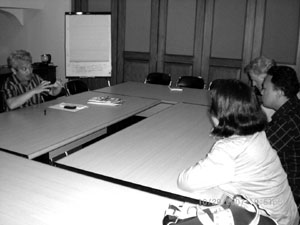 In fact while we were at the AFAD training session on management in Manila, newspapers headlines were detailing progress in the first “Amparo” suit filed in favor of two young university students Sherlyl and Karen who had been taken by army soldiers in the region of Bulacan almost a year ago together with a local farmer, and had never been heard of since. Two young brothers who escaped from secret custody claimed that they saw the girls in military detention but these youths were in fear of their life. They had received guarantees of protection in order to cooperate with the judicial investigations. Hearings were scheduled and it was hoped that at least the truth would come out this time. In fact while we were at the AFAD training session on management in Manila, newspapers headlines were detailing progress in the first “Amparo” suit filed in favor of two young university students Sherlyl and Karen who had been taken by army soldiers in the region of Bulacan almost a year ago together with a local farmer, and had never been heard of since. Two young brothers who escaped from secret custody claimed that they saw the girls in military detention but these youths were in fear of their life. They had received guarantees of protection in order to cooperate with the judicial investigations. Hearings were scheduled and it was hoped that at least the truth would come out this time.
My impression then is of a serious human rights situation in the Philippines which the Gloria Arroyo Government has aggravated by her clamp-down on terrorism. The positive note is that Filipino society and its democratic institutions are beginning to react. Moreover as a fully fledged member of the UN Human Rights Council, the Philippines is scheduled to face, together with Indonesia, the Universal Review Procedure during the next few weeks, and that fledging UN body will certainly be putting additional pressure on both administrations to substantially better their human rights performance.
Indonesia
While the Philippines has the long Marcos regime to overcome in its democratic transition, Indonesia has to leave behind its 31 years of dictatorship under General Suharto when he dramatically resigned in 1998. In fact his regime, called enigmatically the “New Order” began with a genocide of communist party sympathizers and their families all over the different islands of Indonesia in 1965 that still shocks the world. Some 500,000 people were massacred and thousands of prisoners were held in veritable “Gulags” for years. The trauma was such that it was only twenty years afterwards in the eighties that student and religious movements began to challenge the repressive Suharto machine. Up to then, anticommunism was still a powerful instinctive force in Indonesian society. And since then, you have successive rounds of repression and the families of victims have been organizing to demand justice and truth.
Meanwhile, Indonesia has become an economic success story because of its oil production but also with military officers becoming important business leaders. In 1997 / 98 especially after bloody repressive campaigns in East Timor, Papua and Aceh came the nemesis for Suharto with student uprisings which he brutally repressed. He could no longer manage the situation and had to step down. There was a short democratic Spring time with President Abdurrahman Wahid who undid some of the repressive apparatus but he was impeached in 2000 for corruption. Then the taciturn President Megawati took over who, despite her democratic credentials, threw herself right into the hands of the military. The current president Susilo Bambang Yudhoyono (SBY) is a former military general and was elected president in 2004 defeating Ms. Megawati.
My visit to Jakarta was indeed a personal experience. Aileen Bacalso, AFAD General Secretary and I were hosted in a hotel close to the
KONTRAS offices or compound. In fact on Saturday morning, we paid our first visit there where we were welcomed by several activists who kept an eye on security and go about their own tasks including some handicraft work in wood. Afterwards I discovered that some were survivors who had spent many years in prison. One older man had been a prominent politician in the early sixties who managed to survive and now almost 50 years afterwards, never misses any human rights activity. Victims’ families have a small shop at the entrance to provide cigarettes and soft drinks. At the heart of the office is a large open hall which is used for public meetings. Close nearby, crossing through picturesque narrow streets is the
IKOHI house decked with a large red and white Indonesian flag. Here, I had interesting dialogs with several women who had also spent many years in prison.
Meeting with the Authorities
On Monday, we went with Aileen and a large delegation to meet with the Minister of Law and Human Rights Mr. Andy Mattalatta. There were representatives from
KONTRAS and IKOHI including their respective leaders Usman Hamid and Mugiyanto. A retiring man, the Minister listened and spoke with us during more than one hour focusing on the question of the disappeared, the judicial process and the Munir case. He was accompanied by the director general of the Ministry, Professor Harkristuti. He was on the defensive most of the time but did promise that Indonesia would sign the Convention. One had the impression of a government that knows it is underperforming in human rights but is hesitant to take any firm step forward to break the circle of military impunity. In fact, in Indonesia, no human rights initiative has progressed over these last years, not even the proposed Truth Commission which was disbanded for apparently legal reasons only a few months ago. However, we must appreciate the time the Minister spent with us which shows his interest in the subject.
That afternoon we met with officers of the multilateral section of the Ministry for Foreign Relations. Here, more detail was given to us on the red tape they saw necessary before signing the Convention. Detail was also given to us on the different visits which Indonesia has received over the past few months from UN Special Rapporteurs. A special case is that of Mr. Philip Alston from Australia who works on extrajudicial killings and whose most recent request to visit the country was deferred to a future date. It seems that the Indonesian authorities still have to learn that international scrutiny of human rights observance is a fact of life and can be most beneficial to help ending abuses. Rather it is perceived as an arbitrary intrusion into their own internal affairs. As Asia does not have any regional human rights controlling mechanism to deal with on a regular basis, their governments are not accustomed to being monitored on human rights and so they become somewhat paranoid. Hopefully negotiations will be speeded up to adopt that long over-due regional system as soon as possible.
The following day, we visited the Indonesian National Commission on Human Rights. There are now national commissions in most Asian countries and were created as an independent institutional space within the State apparatus in order to handle human rights affairs. They are a kind of bridge between civil society and the administration itself. We have ombudsman offices in Latin America but are quite different from national commissions. The National Commission in Indonesia should have some 30 members but only 20 commissioners have been appointed. Apparently, the first Commission was a failure as many military officers were appointed.. Now members come more from the NGO community and it has much more credibility. Indeed our visit with them was most amenable and one could clearly see that their heart was in human rights observance. Their annual reports detail their investigations of key cases down the years. But one senses that there is little or no political will on behalf of the government to address and resolve those issues. However, it is good to have that official space for human rights installed right in the State itself.
Speaking with University Students
Meanwhile, the IKOHI house was a hive of activity as families prepared photo panels for a wall exhibition which adorned the walls of the
KONTRAS multi-purpose hall during our meeting with university students. Close on a hundred students from 4 different universities attended our talk on AFAD,
FEDEFAM and our joint struggle against enforced disappearances. Many questions were asked and I was overwhelmed by the enthusiasm and heart searching which those young men and women showed in their reflections. They were determined to see a different Indonesia based on justice, peace and the end of impunity.
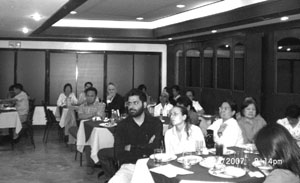 It was in our sharing with the students that I began to get a sense of how significant Munir (founder of
KONTRAS, IMPARSIAL and Chair of AFAD) was and is to the entire Indonesian human rights movement. His cowardly assassination through arsenic poisoning three years ago is a major blood stain on the military and on all Indonesian institutions that have been unable to administer justice in his case. In my intervention, I compared Munir with Martin Luther King and his fight against racial discrimination in the 60s in the US. The difference is that world outrage was expressed at Martin Luther King´s assassination, and racial discrimination was formally terminated by the US Congress almost immediately afterwards. There is no doubt that in terms of human rights organizing and activism, Munir had integrity, commitment and those courageous leadership qualities which made him into one of the moral giants of our times, just like Martin Luther King. It was an honor to be in the institution which he had founded and nourished, to share with his colleagues and friends and to meet Suciwati, his wife and companion of so many struggles. Munir, in death, has become a beacon for human rights activists all over Asia and indeed the world. It was in our sharing with the students that I began to get a sense of how significant Munir (founder of
KONTRAS, IMPARSIAL and Chair of AFAD) was and is to the entire Indonesian human rights movement. His cowardly assassination through arsenic poisoning three years ago is a major blood stain on the military and on all Indonesian institutions that have been unable to administer justice in his case. In my intervention, I compared Munir with Martin Luther King and his fight against racial discrimination in the 60s in the US. The difference is that world outrage was expressed at Martin Luther King´s assassination, and racial discrimination was formally terminated by the US Congress almost immediately afterwards. There is no doubt that in terms of human rights organizing and activism, Munir had integrity, commitment and those courageous leadership qualities which made him into one of the moral giants of our times, just like Martin Luther King. It was an honor to be in the institution which he had founded and nourished, to share with his colleagues and friends and to meet Suciwati, his wife and companion of so many struggles. Munir, in death, has become a beacon for human rights activists all over Asia and indeed the world.
We had a free day on Wednesday which I took advantage of to read about Indonesian history and exchange with families and victims. I read through Geoffrey Robinson´s book, The Dark Side of Bali which detailed the 1965 repression in that paradise island, a gruesome reality which visiting tourists and hosts prefer to push under the carpet: 80,000 including men, women and children killed on the island within the space of a few months and still no justice.
The Munir Case
Thursday proved to be the most interesting day. In the morning, at the invitation of Sri, legal adviser at
KONTRAS, I joined a large delegation dressed in black Munir t-shirts and we went to a hearing on the case. The legal process has become a TV serial for the Indonesian judiciary. After convicting Garuda pilot-cum-intelligence agent Pollycarpus to 15 years imprisonment for his role in the assassination, the sentence was overruled a year ago. However, a secretary from the Garuda Air Company has been charged with forgery and is now in prison. Her defense attorneys argued for her release the previous week, and in the session we attended at the central court building in Jakarta, the Attorney General legal team replied to the arguments of the defense. The judges will give their ruling next week.
As I sat listening to some of the points of law which had been raised, observing the judges at the bench, the defendants and attorneys all clad in gowns with the accused young lady sitting, facing them, and the public seated on simple wooden benches with TV cameras recording the proceedings, I could not but reflect if Indonesian justice would ever be able to prosecute those responsible for the cowardly murder of Munir. I was then informed that some leading lawyers in the Pollycarpus defense team were former colleagues of Munir at the Legal Aid Institute where he had trained. However, the Indonesian system is a reflection of the much acclaimed Dutch legal system which has given us the International Criminal Court (ICC) created by the Rome Statute that sits in the historic town of The Hague. Maybe the ICC could step in and be more successful for the sake of justice and human rights. However, Indonesia has not signed the Rome Statute.
Later I had the opportunity to speak with Usman, and friends about the conduct of Holland in the Munir case itself. The most incriminating action of the Dutch authorities was their handling of the autopsy results which were not given to the family of Munir until after more than 60 days and then after a doctor had leaked the news that he had been poisoned with a massive dose of arsenic. Dutch authorities have defended their actions saying that Indonesia had a prior claim to jurisdiction on the case and everything was out of their hands. Delays were further explained by the need for a second autopsy and that the laboratory was not functioning at the time. However, there is the suspicion of connivance between Dutch and Indonesian authorities. That may remount to relations between a European colonial power and its principal overseas colony up to recently. Moreover, Presidential elections were scheduled in Indonesia at the time. If the news of
Munir´s assassination had been out before that, then it could have detrimental effects on the official candidacy. Without going into jurisdictional intricacies, what is inexplicable is that no attempt was made by Dutch authorities, who carried out the inquest, to inform his next of kin or to speed criminal
investigations. Holland must have known of Indonesia’s traditionally bad record in human rights. I believe Holland has to account for this conduct in the Munir case even though the principal responsibility is undoubtedly that of Indonesia. Could the case be appealed to the European Court of Human Rights? I think so. The precedent as it stands is most disturbing.
Public Protest with the Families of the Disappeared and Survivors
Returning to KONTRAS on Thursday, we had a public meeting with families and survivors. I showed them a video on a
HIJOS street protest against Argentine dictator Videla and shared about what was happening in the Latin American region with progressive governments in Venezuela, Brazil, Argentina, Bolivia, Ecuador, Chile and Uruguay. Impunity was finally being turned around and new prosecutions against human rights perpetrators were under way. 1000 cases were now filed in courts in Argentina and 500 in Chile. Several perpetrators have received life prison sentences, but witnesses are threatened and one disappeared as was the case of Julio Jose Lopez last year in Argentina. In the sharing afterwards, different generations of Indonesian victims and their families shared their frustrating experiences in the struggle against impunity, and I was given documents reporting the atrocities of 1965.
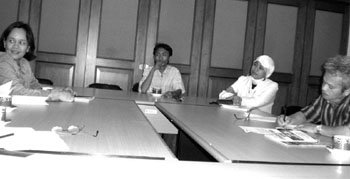 Then it was time to travel to downtown for the weekly Thursday protest in front of the Presidential palace. We were a bus load of people for the downtown trip. The group installed itself in a small public space at the entrance of the National Park facing across a most sedate building not unlike the White House. The police were awaiting us but did not intervene as the families set up their banners with the portrait of Munir, photos of the disappeared and written slogans. Two protesters paraded in front with a poster, and flyers were handled out to passersby. The protest was most evident to the intense traffic that went by on that central avenue. Many of the protesters also had large black umbrellas with slogans against impunity inscribed on them. They stood in silence for an hour until their vigil ended.
Then it was time to travel to downtown for the weekly Thursday protest in front of the Presidential palace. We were a bus load of people for the downtown trip. The group installed itself in a small public space at the entrance of the National Park facing across a most sedate building not unlike the White House. The police were awaiting us but did not intervene as the families set up their banners with the portrait of Munir, photos of the disappeared and written slogans. Two protesters paraded in front with a poster, and flyers were handled out to passersby. The protest was most evident to the intense traffic that went by on that central avenue. Many of the protesters also had large black umbrellas with slogans against impunity inscribed on them. They stood in silence for an hour until their vigil ended.
I was impressed. I was told the protest was inspired by the Argentine Madres and certainly the protagonists were not that much different: families of the disappeared, mostly women, middle-aged survivors and activists. I could see a good sense of purpose in terms of denouncing impunity. During the protest, a small delegation crossed over to the President’s office to deliver a letter. Organizers were concerned if they will be able to continue the weekly protest, but they have been able to institutionalize a presence at the center of power which is important to sustain until a satisfactory response is achieved.
Neo-liberalism - A controversial subject?
The final public event of my visit to Indonesia was a debate with trade union leaders and activists on Argentina, the IMF , Neo Liberalism and Human Rights. However, the Indonesian police and military sent agents along to monitor proceedings so we had to change the venue and time. The Canadian documentary “The Take” was shown and that led to an intense debate on the subject. I underlined the importance of relating political repression to the implementation of neo-liberal economic policies which had caused so much damage to the social fabric in Latin America. There is now a roll back process under way in many Latin American countries with the reaffirmation of the role of the State to ensure equilibrium in economic development with the recovery of its central role in education, health and labor creating policies. There is, however, a perception in Indonesia that Argentina above all - is endorsing on such radically new economic and political policies as to be putting the current neo liberal status in jeopardy. Coupled with the publicized results of the Argentine elections putting Cristina Fernandez in as new President and rumors that soccer icon Diego Maradona may visit Indonesia at any moment on a human rights trip, Indonesian military intelligence must have decided to monitor our public conference. It was a total surprise for me and my hosts but also a clear sign that our visit did not go unnoticed and of the traditional paranoia of military intelligence everywhere.
Exhumations
I had a final session with KontraS’ staff on the challenge of exhumations that awaits Indonesia as it tries to come to terms with the truth of its past which is most often interred in clandestine cemeteries. If Spain has had to re-look at its own history of the Spanish Civil War over 60 years ago, no doubt Indonesia will have to review the tragic events of 1965 that have shaped so much of its recent history. The exhumation situation is much more acute in Aceh where killings have been much more recent. The implementation of policies is urgently needed that contemplate both the needs of families to give proper burial to their loved ones and the need to preserve evidence of terrible crimes for future prosecutions.
Conclusions
My final evening in Jakarta was spent celebrating Mugiyanto’s birthday at a party at the International Peace Brigades offices. It was a home coming for me. I had worked close liaison with the PBI in Guatemala in the early ´80s when human rights defenders there needed 24- hour protection. Now they offer the same protection to Suciwati and other defenders in Indonesia. It was good to be at such a gathering where solidarity is not just a word but a real commitment. Then on the following day, Agnes of
IKOHI took special care to get me on a taxi to the airport on time for the long trip back to Buenos Aires. However, not before we had formulated plans for a training seminar for AFAD members to be held in Buenos Aires in 2008. I would say now that organizing that event will also be my commitment in gratitude for the generosity and friendship of our AFAD sisters and brothers...
Summing up then, Asia may not be the “morning of the world “ in terms of human rights, but I foresee a new dawn for the Continent fast approaching, thanks to the heroic struggle of survivors, families and human rights activists. The dark night is over! Thank you for allowing me to share that hope with you.

Patricio Rice is a survivor of enforced disappearance during the dictatorship in Argentina. An Irish by nationality, he received support from the Irish government during his secret detention. For which reason, he was resurfaced and later released after a year of imprisonment. He is presently the
FEDEFAM adviser.
VOICE May 2008
|